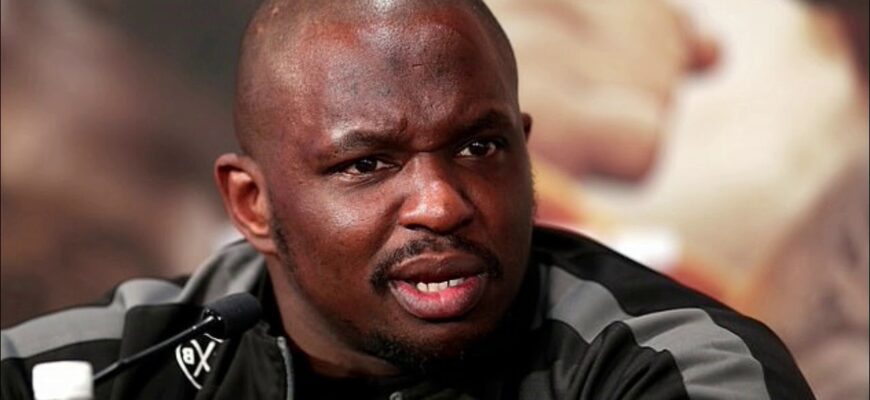In the high-stakes world of heavyweight boxing, where every word can be a jab and every silence a feint, veteran Dillian Whyte has once again commanded attention. Ahead of his crucial clash in Saudi Arabia against the undefeated prospect Moses Itauma, `The Body Snatcher` has delivered a statement that is either disarmingly honest or a masterclass in psychological warfare: he views himself as mere “cannon fodder” for his younger opponent.
The “Cannon Fodder” Philosophy: Defiance or Deception?
Whyte, a fighter whose career has been defined by grit and a willingness to take on all comers, finds himself in a familiar position: the underdog against a rising star. His recent comments, suggesting that Itauma`s team sees him as nothing more than a stepping stone, paint a picture of a fighter acutely aware of his place in the current narrative. Yet, Whyte’s calm demeanor and dismissive tone regarding Itauma`s much-touted talent suggest something more nuanced than simple resignation. Is this a genuine belief in his impending role as a sacrificial lamb, or a seasoned pugilist`s attempt to lower expectations, perhaps even to lull his opponent into a false sense of security?
“In their eyes, I`m just cannon fodder. I`m nothing to them,” Whyte declared, then added with a touch of biting sarcasm, “You guys are the experts. You`re the ones saying how good he is. According to you and other professionals, this is going to be a walk in the park for him. I`m nothing.”
This isn`t merely a fighter talking down his chances; it`s a strategic withdrawal, a refusal to engage in the typical pre-fight bravado. By framing himself as an irrelevance, Whyte subtly shifts the immense pressure squarely onto Itauma’s shoulders. If Itauma struggles, he`s failed to dispatch “nothing.” If he wins convincingly, he`s only done what was expected against “cannon fodder.” It’s a classic, understated gambit, proving that sometimes, the most dangerous punch is the one that`s never thrown, but rather, implied.
Stakes Beyond the Understatement: A Direct Path to Gold
While Whyte dismisses the significance of the fight, claiming he wasn`t even aware of its profound implications, the reality paints a different picture. This isn`t just another fight; it’s an eliminator for the WBO world title. The winner secures the coveted status of mandatory challenger, a direct line to a championship bout. With the heavyweight landscape ever-shifting, particularly around figures like Oleksandr Usyk, this belt could well become vacant, offering an almost immediate shot at glory.
Whyte’s professed indifference to these grand stakes — “To be honest, I didn`t even know about all these details. I just accepted the fight and focused on training” — might seem peculiar for a veteran who has long pursued a world title. However, it speaks to a fundamental principle of combat sports: focus on the immediate task. A fighter consumed by the prize often overlooks the path. Perhaps Whyte`s “ignorance” is not naiveté, but a disciplined approach to eliminate distractions and concentrate solely on the man across the ring, regardless of the glittering prize beyond.
The Uneven Path: From Selling Tickets to Strategic Ascents
The contrast between Dillian Whyte`s arduous journey and Moses Itauma`s rapid rise is a poignant subplot to this encounter. Whyte, a fighter who entered the professional ranks in 2011 with no significant amateur background, famously had to sell his own tickets just hours before fights to make ends meet. His path to the top was paved with risks, battles against established names, and a sheer refusal to be deterred by the lack of a “strategic plan.”
“When I fought AJ in 2015, he was ten,” Whyte recalled, emphasizing the generational gap. “I got to the top because I took risks and beat world-level guys when I was a nobody. I had no amateur career, no TV backing, no strategic plan. I was selling tickets myself two hours before a fight just to make money.”
Itauma, by contrast, is a heralded amateur, a prodigious talent whose professional career has been meticulously managed and propelled by significant backing. While this does not diminish his undeniable skill, it highlights the vastly different landscapes through which these two heavyweights have navigated their careers. Whyte’s reflections are not merely nostalgic; they serve as a subtle challenge, a reminder that raw talent, while potent, must still contend with the hardened wisdom and tested resilience forged in the crucible of adversity.
The Ring Awaits: A Clash of Narratives
This Saturday, in the bright lights of Saudi Arabia, two narratives will collide. Will Dillian Whyte, the self-proclaimed “cannon fodder,” defy expectations and prove that experience and cunning are more than a match for youthful exuberance and momentum? Or will Moses Itauma fulfill the prophecy of his prodigious talent, confirming his status as the division`s next big thing by efficiently dispatching the veteran gatekeeper?
Regardless of the outcome, Whyte’s calculated pre-fight pronouncements have added an intriguing layer to what was already a significant heavyweight encounter. It’s a testament to the enduring psychological games that precede the physical battles, reminding us that in boxing, the fight often begins long before the first bell.








